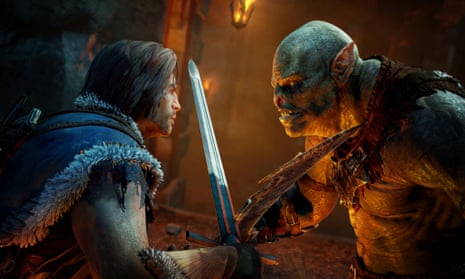Warner Bros; PC/PS3/PS4 (version tested)/Xbox One/Xbox 360; £45; Pegi rating: 18+
You’d be forgiven for not getting too excited about Middle Earth: Shadow of Mordor. There’s that clunking title for one thing, forged in the most basic video game name generator. Then there’s the licence itself – the gaming battlefield is littered with the corpses of near-forgotten sub-par genre contenders half-heartedly wrestled into an uncomfortable fit with Tolkien’s fantasy world.
And the tick list of features from the back of the box does very little to generate much more excitement – beyond the one noticeable exception I’ll get to later. The game wears its influences shamelessly: this is Arkham’s Creed with a side order of Grand Theft Far Cry. And orcs. Lots of orcs.
And yet …
It turns out that Shadow of Mordor is that rarest of things in video game culture - an unexpected knockout punch. It’s also a glorious return to form for one of the most interesting developers out there – Washington-based Monolith Productions – whose track record is inconsistent but features glorious oddities such as No One Lives Forever, FEAR and Condemned.
The story of Mordor, much like the rest of the game, is a Frankenstein’s monster. You are Talion, a ranger of Gondor responsible for guarding the Black Gate of Mordor. In an assault by Sauron’s army you and your family are killed, but you find yourself returned to life and twinned with a mysterious wraith who gives you magical powers. The stage is set for you to sneak across a battered landscape, doling out revenge on Sauron’s minions. It’s basically Batman with a longsword.
It sounds awful, doesn’t it? But Monolith sends out an early sign of quality with an introductory cut-scene that doesn’t outstay its welcome and features voice actors who don’t sound actively appalled by the dialogue. It’s told with the economy and flair you’d expect from one of the writers of Red Dead Redemption and everyone involved sees the plot for what it is – a peg to hang a game on. Which makes it exactly 100 times more enjoyable than almost every high-profile game with literary or filmic pretensions.
How to slay a monster
It’s the same for the basic mechanics. Monolith does what anyone who’s played Assassin’s Creed recently wishes Ubisoft would do – it makes the parkour tighter, makes the stealth coherent and consistent, rips out the combat model and replaces it with something inspired by Rocksteady’s Batman. The team then gets the story out of the way as quickly as possible, and then doesn’t waste development time on a card game simulator that no one wants; it reduces the size of the map and trims back the 12 million tedious side quests to a handful that actually benefit the player in gameplay.
It sounds so simple, but it’s bracingly surprising to simply sneak up on an isolated band of Uruk-hai and start tripping off the various systems Monolith gives you to dispatch them – safe in the knowledge that they all work as they should.
And that’s not taking into account Shadows’ trump card – the Nemesis system. It sounds too good to be true: the game responds dynamically to your actions, shifting the Orc’s hierarchy as you make your way through and generating a roster of enemies who look, speak, behave and fight very differently. Injure an orc in a battle and you’ll find later on that they not only remember you, they also bear the scars of your recent attentions. Find yourself caught out by a lowly Uruk-hai in a melee and when you return to life they’ll now be promoted up the chain of command and will taunt you when you next face them.
How much of this is smoke and mirrors is a moot point. It feels like it’s doing what it promises and it transforms the two tight open-world maps into something living and engaging. Every session of the game is peppered with moments of glorious chaos that feel far more rewarding and exciting than the scripted fodder Grand Theft Auto or Assassin’s Creed push in the player’s direction.
New but old
Two PS2-era games continually sprang to mind as I made my way through the Uruk-hai ranks with a pleasing sense of power and purpose – Psi Ops: The Mindgate Conspiracy and Metal Arms: Glitch in the System.
Neither of these are remembered terribly well by the majority of gamers, and both share with Shadows a godawful title, unpromising narrative, a few ragged edges and a comparative lack of pre-release hype. But they also featured thumpingly well-executed mechanics, emergent gameplay and at least one genuinely game-changing idea. You could argue that games like these lack a sense of scope that can only ever mean they’re second-tier. But in a straight fight between Shadow’s eagerness to please and, say, Destiny’s production values, sterility and self-proclaimed ambition, and there’s only one winner for me, and it’s not Bungie.
That may sound hyperbolic, and true, Shadows of Mordor isn’t perfect by any means. But right now, it’s my main contender for game of the year, simply because, in its lack of pretension, its attention to detail and its understanding that video games first and foremost should be fun, it puts everything else I’ve played recently in its long shadow.

Comments (…)
Sign in or create your Guardian account to join the discussion